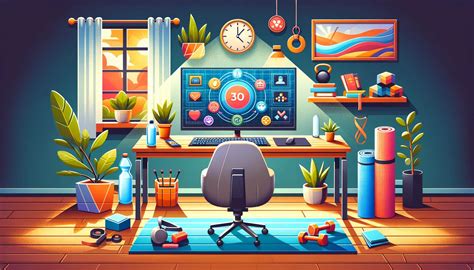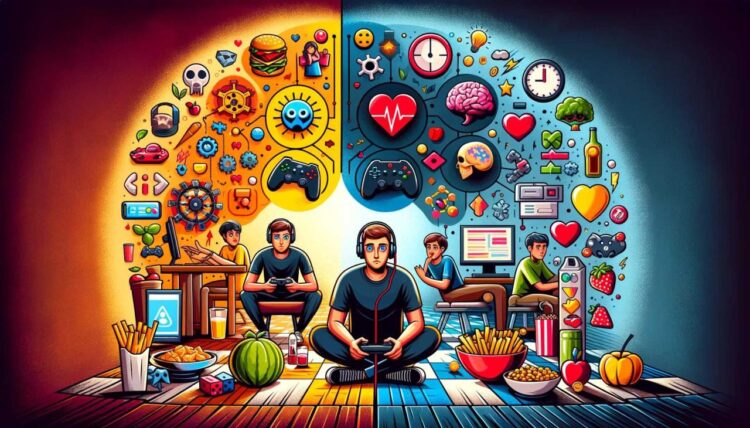In the vast and ever-expanding universe of digital entertainment, video games have evolved from niche pastimes into a pervasive cultural phenomenon, engaging billions across the globe. Beyond mere recreation, gaming offers intricate narratives, complex problem-solving, and vibrant social communities. Yet, as the lines between virtual and real life blur, so too does the conversation surrounding the profound and often complex interplay between gaming and mental health. For many, gaming provides an invaluable escape, a source of connection, and a platform for skill development. For others, it can present challenges that impact psychological well-being. Understanding this multifaceted relationship is crucial for players, parents, educators, and mental health professionals alike, making “gaming and mental health” a highly searched topic and a valuable area for content creators aiming for high Google AdSense relevance and engagement. This comprehensive article will delve into the diverse ways gaming impacts mental well-being, exploring both its significant benefits and potential pitfalls, while offering actionable insights for fostering a healthy, balanced digital life.
The Allure of Gaming: Why We Play
To understand gaming’s impact on mental health, we must first recognize its inherent appeal. Video games offer unique psychological rewards that few other mediums can match.
- Mastery and Achievement: Games provide clear goals, immediate feedback, and opportunities for skill progression. The feeling of mastering a complex mechanic, solving a challenging puzzle, or overcoming a difficult boss can be incredibly gratifying, boosting self-esteem and a sense of accomplishment.
- Social Connection and Community: Multiplayer games, especially massively multiplayer online role-playing games (MMORPGs) or competitive online games, foster vibrant communities. Players form friendships, join guilds or clans, and collaborate towards common goals, fulfilling fundamental human needs for belonging and social interaction. For individuals who may struggle with in-person social anxiety, online communities can provide a safe space to connect.
- Escape and Stress Relief: Games offer a powerful form of escapism, allowing players to temporarily step away from real-world pressures, anxieties, or monotonous routines. Engaging in a fictional world can be a highly effective way to de-stress and unwind.
- Cognitive Stimulation: Many games demand strategic thinking, quick decision-making, problem-solving, and rapid hand-eye coordination. This constant cognitive engagement can sharpen various mental faculties.
- Creativity and Self-Expression: Games like Minecraft, Roblox, or even character customization in RPGs provide platforms for boundless creativity, allowing players to build worlds, design characters, and express their unique identities.
- Flow State: Often, players enter a “flow state,” a deep, immersive concentration where time seems to disappear. This state is highly enjoyable and can be very restorative, providing a break from self-conscious thoughts or anxieties.
These inherent attractions lay the groundwork for both the positive and negative influences gaming can have on an individual’s mental state.
Positive Impacts of Gaming on Mental Health
While concerns about excessive gaming often dominate headlines, robust research highlights numerous ways video games can significantly benefit mental well-being.
A. Cognitive Enhancement and Problem Solving
Many game genres actively train and refine critical cognitive abilities.
- Improved Problem-Solving Skills: Puzzle games, strategy games, and open-world adventures constantly present complex challenges that require logical thinking, planning, and adapting strategies. Players learn to analyze situations, anticipate outcomes, and devise creative solutions.
- Enhanced Executive Functions: Games can boost executive functions such as working memory, attention span, and cognitive flexibility. Fast-paced action games, for instance, demand quick shifts in attention and simultaneous processing of multiple stimuli.
- Faster Reaction Times: Competitive and action-oriented games demonstrably improve reaction times and hand-eye coordination, skills that can translate to real-world tasks.
- Spatial Reasoning: Games involving navigation, building, or 3D environments (e.g., Minecraft, architectural simulation games) can enhance spatial awareness and visualization skills.
B. Stress Reduction and Emotional Regulation
Gaming offers unique avenues for managing stress and navigating complex emotions.
- Escapism and Distraction: For many, games provide a healthy, temporary escape from real-world anxieties, allowing the mind to disengage from stressors and recharge. This can be particularly beneficial for individuals dealing with chronic pain, anxiety, or depression.
- Emotional Outlet: Games can serve as a safe space to experience and process emotions. Venting frustration in a competitive match or experiencing the triumph of overcoming a challenge can provide a cathartic release.
- Mood Improvement: The sense of achievement, social interaction, and immersive experiences in games can trigger the release of dopamine and other neurotransmitters, leading to feelings of pleasure and improved mood.
- Mindfulness and Flow State: Engaging deeply in a game can induce a “flow state”—a state of complete absorption where one is fully immersed and energized. This mindful state can be highly therapeutic, reducing rumination and promoting mental clarity.
C. Social Connection and Community Building
Despite stereotypes of isolated gamers, many games are powerful platforms for social interaction and connection.
- Building Friendships: Multiplayer games facilitate the formation of strong bonds, sometimes transcending geographical boundaries. Players often develop deep friendships with teammates, relying on each other for support both within and outside the game.
- Developing Social Skills: Online gaming environments require communication, teamwork, negotiation, and conflict resolution. These interactions can help players, especially those who are shy or introverted, develop and practice vital social skills in a lower-stakes environment.
- Support Networks: Gaming communities can become vital support networks, particularly for individuals feeling isolated or struggling with mental health issues. Shared interests create common ground and a sense of belonging.
- Inclusivity: Gaming offers a platform where physical limitations or social anxieties that might hinder in-person interactions become less relevant, fostering more inclusive social environments.
D. Therapeutic Applications
The unique characteristics of games have led to their increasing use in therapeutic settings.
- Cognitive Behavioral Therapy (CBT) Reinforcement: Games can be designed to reinforce CBT principles, helping individuals practice coping mechanisms, challenge negative thought patterns, or engage in exposure therapy for phobias.
- Anxiety and Depression Management: Certain slow-paced, atmospheric games (e.g., “Stardew Valley,” “Animal Crossing”) can be calming and provide a sense of control, which can be beneficial for individuals with anxiety or depression.
- Pain Management: The immersive nature of games can distract from chronic pain, reducing the perception of discomfort. Virtual reality games are particularly effective in this area for conditions like burn recovery or phantom limb pain.
- Skill Development for Special Needs: Games are used to help individuals with autism spectrum disorder practice social cues, emotional recognition, and problem-solving in a structured environment. They can also aid in physical therapy and rehabilitation.
Potential Negative Impacts and Risks
While gaming offers many benefits, it’s crucial to acknowledge and address the potential negative impacts on mental health, primarily when gaming becomes excessive or compulsive.
A. Gaming Disorder (Addiction)
The most significant concern is the potential for gaming disorder, classified by the World Health Organization (WHO) as an addictive behavior.
- Impaired Control: Inability to limit gaming time, despite negative consequences.
- Prioritizing Gaming: Gaming takes precedence over other life interests and daily activities (school, work, relationships, hygiene).
- Escalation: Increasing gaming time to achieve the same level of satisfaction.
- Continuation Despite Negative Consequences: Continuing to game despite experiencing significant problems related to it.
- Withdrawal Symptoms: Experiencing irritability, anxiety, sadness, or restlessness when unable to play.
If these behaviors are severe enough to result in significant impairment in personal, family, social, educational, occupational, or other important areas of functioning, and have been evident for at least 12 months, it may indicate a gaming disorder.
B. Sleep Deprivation
Excessive gaming, especially late at night, significantly disrupts sleep patterns.
- Blue Light Exposure: Screens emit blue light, which suppresses melatonin production, making it harder to fall asleep.
- Mental Arousal: The excitement and cognitive demands of gaming keep the brain active, hindering relaxation.
- Disrupted Circadian Rhythm: Irregular sleep patterns throw off the body’s natural sleep-wake cycle, leading to chronic fatigue, irritability, and decreased cognitive function.
C. Social Isolation and Relationship Strain
While online gaming fosters community, excessive gaming can displace real-world social interactions.
- Neglecting Offline Relationships: Spending too much time gaming can lead to neglecting family, friends, and romantic partners, causing conflict and isolation.
- Reduced Face-to-Face Interaction: Over-reliance on online social circles can diminish opportunities for developing crucial in-person social skills.
- Withdrawal from Activities: Abandoning hobbies, sports, or other social engagements in favor of gaming.
D. Academic and Occupational Impairment
Gaming can negatively impact performance in school or work.
- Missed Deadlines/Assignments: Time spent gaming may replace study or work hours.
- Decreased Concentration: Sleep deprivation and constant stimulation from games can make it harder to focus on academic or professional tasks.
- Lower Grades/Job Performance: Direct consequences of reduced effort and focus.
E. Mental Health Exacerbation
While gaming can be a coping mechanism, it can also worsen underlying mental health conditions.
- Increased Anxiety and Depression: For some, using gaming as an avoidance strategy can prevent addressing root causes of anxiety or depression, creating a cycle of reliance and worsening symptoms.
- Aggression and Irritability: Exposure to violent content, competitive pressure, and online toxicity can contribute to increased irritability or aggressive outbursts in some individuals.
- Low Self-Esteem: Failing to achieve goals in-game, or comparing oneself to professional gamers, can sometimes lead to feelings of inadequacy.
- Exposure to Toxicity: Online gaming communities can be rife with harassment, cyberbullying, and toxic behavior, which can significantly impact a player’s mental well-being and self-esteem.
F. Physical Health Issues
Though not directly mental health, physical health problems can indirectly impact mental well-being.
- Sedentary Lifestyle: Prolonged sitting leads to lack of exercise, increasing risks of obesity, cardiovascular disease, and other health issues.
- Poor Posture and Repetitive Strain Injuries: Hours spent hunched over a screen can cause back pain, neck strain, and conditions like carpal tunnel syndrome.
- Eyestrain and Headaches: Extended screen time without breaks can lead to digital eyestrain, dry eyes, and tension headaches.
- Poor Nutrition: Skipping meals or relying on unhealthy snacks during gaming binges can lead to nutritional deficiencies.
Fostering a Healthy Relationship with Gaming

The goal isn’t to demonize gaming, but to cultivate a balanced and healthy relationship with it. This involves proactive strategies for both individuals and support systems.
A. For Gamers: Self-Regulation and Mindfulness
Empowering players with tools and awareness to manage their gaming habits.
- Set Time Limits: Establish clear, realistic daily or weekly limits for gaming. Use timers, app blockers, or console settings to enforce them.
- Schedule Breaks: Take regular breaks (e.g., 10-15 minutes every hour) to stretch, move around, rest your eyes, and hydrate.
- Prioritize Offline Activities: Actively schedule and commit to non-gaming activities like exercise, social outings, hobbies, and family time.
- Monitor Mood and Behavior: Pay attention to how gaming makes you feel. If it’s leading to irritability, anxiety, or neglect of responsibilities, it’s a sign to re-evaluate.
- Practice Mindful Gaming: Be present and aware while playing. Ask yourself why you’re playing, what you’re gaining, and when it’s time to stop. Avoid using gaming as a sole coping mechanism for negative emotions.
- Seek Diverse Games: Explore games that offer different experiences—story-driven, puzzle, cooperative, or creative games—rather than solely focusing on highly competitive or addictive genres.
- Engage with Positive Communities: Actively seek out and participate in gaming communities that are supportive and respectful, and distance yourself from toxic environments.
- Understand Microtransactions/Loot Boxes: Be aware of the psychological hooks in monetization strategies to avoid excessive spending or compulsive behaviors.
B. For Parents and Guardians: Guidance and Open Communication
Supporting children and adolescents in developing healthy gaming habits.
- Establish Clear Rules and Boundaries: Set consistent limits on screen time and gaming hours, clearly communicating expectations.
- Co-Play and Engage: Show interest in your child’s gaming world. Play games with them, ask about their favorite characters or achievements. This builds trust and understanding.
- Encourage Diverse Activities: Ensure gaming is balanced with outdoor play, sports, reading, schoolwork, and face-to-face social interactions.
- Model Healthy Habits: Children learn by example. Limit your own screen time and demonstrate balanced digital usage.
- Educate About Online Safety: Teach children about cyberbullying, privacy, and the importance of responsible online behavior.
- Recognize Warning Signs: Be aware of excessive irritability when not gaming, neglecting hygiene, declining grades, or withdrawal from other activities.
- Seek Professional Help if Needed: Don’t hesitate to consult a pediatrician, therapist, or mental health professional if you suspect a gaming disorder or other significant issues.
C. For Developers and Industry: Ethical Design
The gaming industry has a role to play in promoting healthier gaming habits.
- Implement Responsible Design Features: Incorporate features like play-time reminders, customizable time limits, or “cool-down” periods.
- Promote Inclusivity and Reduce Toxicity: Develop robust moderation tools, reporting systems, and foster positive community guidelines to combat harassment and bullying.
- Transparency in Monetization: Be transparent about loot box mechanics and other microtransactions to protect vulnerable players.
- Support Research: Fund and collaborate with independent research on gaming’s impact on mental health.
- Offer Mental Health Resources: Partner with mental health organizations to provide in-game or platform-based resources for players who might be struggling.
When to Seek Professional Help
Recognizing the signs that gaming has become problematic is crucial. If you or someone you know is experiencing several of the following, professional help may be warranted:
A. Persistent preoccupation with gaming, even when not playing. B. Increasing time spent gaming to achieve satisfaction. C. Repeated unsuccessful attempts to control, cut back, or stop gaming. D. Loss of interest in previously enjoyed hobbies and activities. E. Continuing to game despite knowing it causes significant problems (e.g., job loss, failing grades, relationship issues). F. Lying to family members or therapists about the extent of gaming. G. Using gaming to escape from or relieve negative moods (e.g., feelings of helplessness, guilt, anxiety, depression). H. Jeopardizing or losing a significant relationship, job, or educational/career opportunity because of gaming. I. Experiencing withdrawal symptoms (e.g., irritability, anxiety, sadness) when gaming is stopped or reduced. J. Impaired functioning in important areas of life (social, occupational, educational) due to gaming.
These are indicators that a gaming disorder or other mental health challenges linked to gaming may be present, and professional assessment is advisable.
The Future of Gaming and Mental Well-being
The relationship between gaming and mental health will only grow more complex and nuanced as technology advances. Virtual reality (VR), augmented reality (AR), and increasingly realistic graphics will offer even more immersive experiences, presenting both greater opportunities for positive impact and new challenges for moderation. The rise of “gamification” in various aspects of life, from education to fitness, also means that game-like elements will continue to influence behavior.
Future research will likely focus on personalized approaches: understanding which types of games benefit specific individuals, how different play styles impact well-being, and developing more sophisticated therapeutic game designs. The conversation will shift from simply “is gaming good or bad?” to “how can we best leverage gaming’s potential for good while mitigating its risks?” It will demand collaboration between game designers, mental health experts, researchers, and policymakers to create digital ecosystems that prioritize player well-being.
Balancing Play for Mental Health
Video games are a powerful force in modern society, offering immense potential for cognitive development, emotional expression, and social connection. They can serve as valuable tools for stress reduction, skill enhancement, and even therapeutic intervention. However, like any powerful tool, they carry risks, particularly when used excessively or compulsively, leading to issues such as gaming disorder, sleep deprivation, and social isolation. The key to navigating this complex relationship lies in fostering a balanced approach. By setting mindful boundaries, prioritizing real-world engagements, practicing self-awareness, and engaging in open communication within families, individuals can harness the profound benefits of gaming while safeguarding their mental well-being. The conversation surrounding gaming and mental health is ongoing and vital. Embracing a holistic perspective, acknowledging both light and shadow, enables us to build a future where gaming genuinely contributes to a richer, more connected, and mentally healthier life for all participants, simultaneously creating highly relevant and valuable content for a broad audience.












